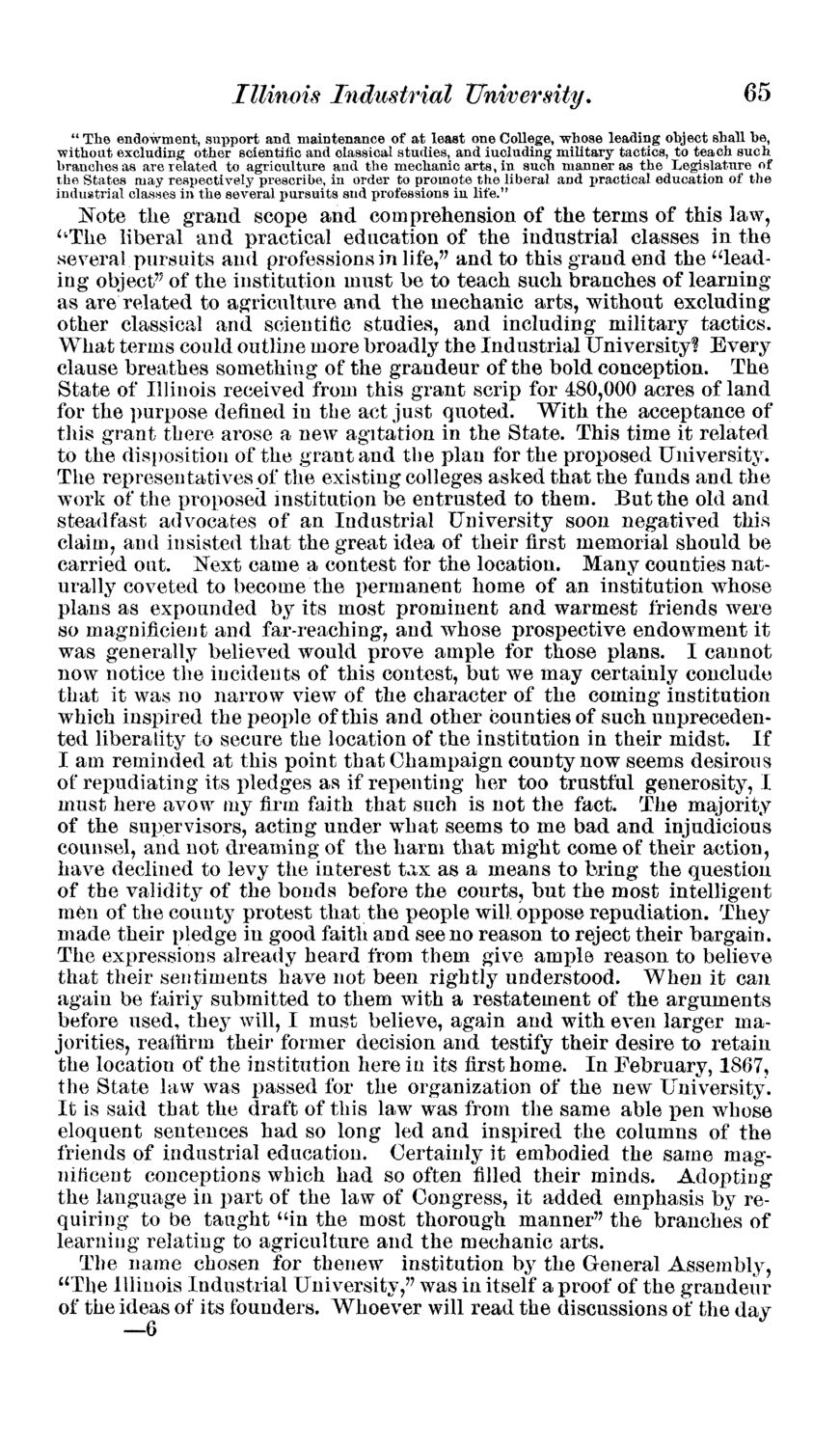| |
| |
Caption: Board of Trustees Minutes - 1874
This is a reduced-resolution page image for fast online browsing.

EXTRACTED TEXT FROM PAGE:
Illinois Industrial University. 65 " The endowment, support and maintenance of at least one College, whose leading object shall be, without excluding other scientific and olassical studies, and iucluding military tactics, to teach such branches as are related to agriculture and the mechanic arts, in such manner as the Legislature of the States may respectively prescribe, in order to promote the liberal and practical education of the industrial classes in the several pursuits snd professions in life." Note the grand scope and comprehension of the terms of this law, "The liberal and practical education of the industrial classes in the several pursuits and professions in life," and to this grand end the "leading object" of the institution must be to teach such branches of learning as are related to agriculture and the mechanic arts, without excluding other classical and scientific studies, and including military tactics. What terms could outline more broadly the Industrial University? Every clause breathes something of the grandeur of the bold conception. The State of Illinois received from this grant scrip for 480,000 acres of land for the purpose defined in the act just quoted. With the acceptance of this grant there arose a new agitation in the State. This time it related to the disposition of the grant and the plan for the proposed University. The representatives of the existing colleges asked that the funds and the work of the proposed institution be entrusted to them. But the old and steadfast advocates of an Industrial University soon negatived this claim, and insisted that the great idea of their first memorial should be carried out. Next came a contest for the location. Many counties naturally coveted to become the permanent home of an institution whose plans as expounded by its most prominent and warmest friends were so magnificient and far-reaching, and whose prospective endowment it was generally believed would prove ample for those plans. I cannot now notice the incidents of this contest, but we may certainly conclude that it was no narrow view of the character of the coming institution which inspired the people of this and other counties of such unprecedented liberality to secure the location of the institution in their midst. If I am reminded at this point that Champaign conntynow seems desirous of repudiating its pledges as if repenting her too trustful generosity, I must here avow my firm faith that such is not the fact. The majority of the sux>ervisors, acting nnder w^hat seems to me bad and injudicious counsel, and not dreaming of the harm that might come of their action, have declined to levy the interest tax as a means to bring the question of the validity of the bonds before the courts, but the most intelligent men of the county protest that the people will oppose repudiation. They made their pledge in good faith and see no reason to reject their bargain. The expressions already heard from them give ample reason to believe that their sentiments have not been rightly understood. When it can again be fairiy submitted to them with a restatement of the arguments before used, they will, I must believe, again and with even larger majorities, reaffirm their former decision and testify their desire to retain the location of the institution here in its first home. In February, 1867, the State law was passed for the organization of the new University. It is said that the draft of this law was from the same able pen whose eloquent sentences had so long led and inspired the columns of the friends of industrial education. Certainly it embodied the same magnificent conceptions which had so often filled their minds. Adopting the language in part of the law of Congress, it added emphasis by requiring to be taught "in the most thorough manner" the branches of learning relating to agriculture and the mechanic arts. The name chosen for thenew institution by the General Assembly, "The Illinois Industrial University,77 was in itself a proof of the grandeur of the ideas of its founders. Whoever will read the discussions of the dav J -6
| |